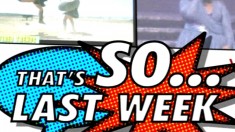 This is a follow up to last week’s blog, “Consolidate and Eliminate.” A magistrate judge in the Western District of Texas seems to be just that in a series of cases (more than 300) filed by Jon Deutsch in Austin, Texas. Deutsch v. Annis Enterprises, Inc., 2016 WL 5317431 (W.D. Tex. Sept. 21, 2016). I won’t provide a detailed analysis of the opinion, which should be read by every lawyer representing defendants in serial litigant cases,* but two points stand out. First, the Court conducted an evidentiary hearing, thus moving past the pleading stage, at which standing depends only on the plaintiff’s willingness to lie. Putting the plaintiff to his proof of standing early in the case is the single most important reason to consolidate and eliminate because it allows the critical fact issue to be resolved early, before the costs of litigation become absurd. More
This is a follow up to last week’s blog, “Consolidate and Eliminate.” A magistrate judge in the Western District of Texas seems to be just that in a series of cases (more than 300) filed by Jon Deutsch in Austin, Texas. Deutsch v. Annis Enterprises, Inc., 2016 WL 5317431 (W.D. Tex. Sept. 21, 2016). I won’t provide a detailed analysis of the opinion, which should be read by every lawyer representing defendants in serial litigant cases,* but two points stand out. First, the Court conducted an evidentiary hearing, thus moving past the pleading stage, at which standing depends only on the plaintiff’s willingness to lie. Putting the plaintiff to his proof of standing early in the case is the single most important reason to consolidate and eliminate because it allows the critical fact issue to be resolved early, before the costs of litigation become absurd. More
ADA – serial litigation
Consolidate and (maybe) eliminate – a new strategy against ADA serial litigants
By Richard Hunt in Accessibility Litigation Trends, ADA - drive-by litigation, ADA - serial litigation, ADA Litigation Procedure Tags: ADA drive-by litigation, ada litigation, Arizona Attorney General, serial litigation
 Two recent cases, one handled by the authors of this blog, illustrate how a strategy of consolidation may make it possible to economically get rid of serial ADA filings where standing is an issue.
Two recent cases, one handled by the authors of this blog, illustrate how a strategy of consolidation may make it possible to economically get rid of serial ADA filings where standing is an issue.
The intervention of the Arizona Attorney General in more than a thousand cases filed under Arizona’s ADA equivalent has been big news for some time in the ADA litigation world. (see our blog, Arizona Attorney General Intervenes to stop abusive ADA litigation) Now, according to the latest news stories (click here), the Attorney General will seek to have the entire group of cases dismissed on standing grounds. The result is still uncertain, but reports that the plaintiff never visited most of the locations sued seem to point toward a decision favorable to the State.** More
Iqbal, Twombly and the ADA
By Richard Hunt in Accessibility Litigation Trends, ADA - drive-by litigation, ADA - serial litigation, ADA FHA Litigation General Tags: ADA pleading, ADA standing, Cheap Standing, Iqbal, Twombly
 Meet Iqbal and Twombly.* Pleading an ADA case sometimes seems trivially easy. Allege a disability, allege an encouter with an architectural barrier, claim intent to return or deterrence and any plaintiff should be able to at least avoid dismissal. It appears, however, that some courts are taking a harder look at the kind of vague allegations found in the pleadings of many serial plaintiffs. This gives defendants new opportunities for early dismissal.** More
Meet Iqbal and Twombly.* Pleading an ADA case sometimes seems trivially easy. Allege a disability, allege an encouter with an architectural barrier, claim intent to return or deterrence and any plaintiff should be able to at least avoid dismissal. It appears, however, that some courts are taking a harder look at the kind of vague allegations found in the pleadings of many serial plaintiffs. This gives defendants new opportunities for early dismissal.** More
Last week’s news – The ADA lesson business never seems to learn.
By Richard Hunt in ADA - drive-by litigation, ADA - serial litigation, ADA FHA Litigation General, Restaurants, Retail, Shopping Centers Tags: "drive-by", ADA drive-by litigation, DIY, DIY ADA Survey, Do It Yourself
 Today’s Google news brought another batch of outraged articles about serial ADA plaintiffs and legislators looking for solutions to the ADA litigation epidemic. The serial filer was in the Wichita, Kansas area, and the legislators were in Colorado, but otherwise the stories were pretty much the same as the stories last week, and the week before, and the week before that. Business owners say they were surprised to find that they were not ADA compliant, and lawmakers say the law should require a pre-suit demand so businesses have a chance to fix their problems before they get sued. The plaintiff, or his lawyer, always points out that the ADA has been in effect for 25 years, so it shouldn’t really be news. More
Today’s Google news brought another batch of outraged articles about serial ADA plaintiffs and legislators looking for solutions to the ADA litigation epidemic. The serial filer was in the Wichita, Kansas area, and the legislators were in Colorado, but otherwise the stories were pretty much the same as the stories last week, and the week before, and the week before that. Business owners say they were surprised to find that they were not ADA compliant, and lawmakers say the law should require a pre-suit demand so businesses have a chance to fix their problems before they get sued. The plaintiff, or his lawyer, always points out that the ADA has been in effect for 25 years, so it shouldn’t really be news. More
Arizona Attorney General Intervenes to stop abusive ADA litigation
By Richard Hunt in Accessibility Litigation Trends, ADA - drive-by litigation, ADA - serial litigation Tags: ADA lawsuit abuse, Arizona Attorney General, serial litigation, Steven Trotten, Strojnik
 This is just a quick note about a major development in the story concerning thousands of lawsuits filed in Arizona by a purported disability rights group. The attorney involved, Peter Strojnik was mentioned in two of my blogs earlier this year. The Economist covers serial ADA litigation – Hunt quoted and Cheap Standing under the ADA. After investigations by the press and local authorities the head of the plaintiff organization has resigned and the Arizona Attorney General has intervened in an effort to shut down the litigation mill. You can read the most recent in a series of stories by Steven Trotten HERE and read the Motion to Intervene HERE. More
This is just a quick note about a major development in the story concerning thousands of lawsuits filed in Arizona by a purported disability rights group. The attorney involved, Peter Strojnik was mentioned in two of my blogs earlier this year. The Economist covers serial ADA litigation – Hunt quoted and Cheap Standing under the ADA. After investigations by the press and local authorities the head of the plaintiff organization has resigned and the Arizona Attorney General has intervened in an effort to shut down the litigation mill. You can read the most recent in a series of stories by Steven Trotten HERE and read the Motion to Intervene HERE. More

